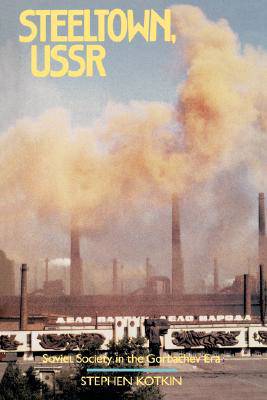
- Retrait gratuit dans votre magasin Club
- 7.000.000 titres dans notre catalogue
- Payer en toute sécurité
- Toujours un magasin près de chez vous
- Retrait gratuit dans votre magasin Club
- 7.000.0000 titres dans notre catalogue
- Payer en toute sécurité
- Toujours un magasin près de chez vous
57,95 €
+ 115 points
Description
No one, not even Mikhail Gorbachev, anticipated what was in store when the Soviet Union embarked in the 1980s on a radical course of long-overdue structural reform. The consequences of that momentous decision, which set in motion a transformation eventually affecting the entire postwar world order, are here chronicled from inside a previously forbidden Soviet city, Magnitogorsk. Built under Stalin and championed by him as a showcase of socialism, the city remained closed to Western scrutiny until four years ago, when Stephen Kotkin became the first American to live there in nearly half a century.
An uncommonly perceptive observer, a gifted writer, and a first-rate social scientist, Kotkin offers the reader an unsurpassed portrait of daily life in the Gorbachev era. From the formation of "informal" political groups to the start-up of fledgling businesses in the new cooperative sector, from the no-holds-barred investigative reporting of a former Communist party mouthpiece to a freewheeling multicandidate election campaign, the author conveys the texture of contemporary Soviet society in the throes of an upheaval not seen since the 1930s.
Magnitogorsk, a planned "garden city" in the Ural Mountains, serves as Kotkin's laboratory for observing the revolutionary changes occurring in the Soviet Union today. Dominated by a self-perpetuating Communist party machine, choked by industrial pollution, and haunted by a suppressed past, this once-proud city now faces an uncertain future, as do the more than one thousand other industrial cities throughout the Soviet Union.
Kotkin made his remarkable first visit in 1987 and returned in 1989. On both occasions, steelworkers and schoolteachers, bus drivers and housewives, intellectuals and former victims of oppression--all willingly stepped forward to voice long-suppressed grievances and aspirations. Their words animate this moving narrative, the first to examine the impact and contradictions of perestroika in a single community. Like no other Soviet city, Magnitogorsk provides a window onto the desperate struggle to overcome the heavy burden of Stalin's legacy.
An uncommonly perceptive observer, a gifted writer, and a first-rate social scientist, Kotkin offers the reader an unsurpassed portrait of daily life in the Gorbachev era. From the formation of "informal" political groups to the start-up of fledgling businesses in the new cooperative sector, from the no-holds-barred investigative reporting of a former Communist party mouthpiece to a freewheeling multicandidate election campaign, the author conveys the texture of contemporary Soviet society in the throes of an upheaval not seen since the 1930s.
Magnitogorsk, a planned "garden city" in the Ural Mountains, serves as Kotkin's laboratory for observing the revolutionary changes occurring in the Soviet Union today. Dominated by a self-perpetuating Communist party machine, choked by industrial pollution, and haunted by a suppressed past, this once-proud city now faces an uncertain future, as do the more than one thousand other industrial cities throughout the Soviet Union.
Kotkin made his remarkable first visit in 1987 and returned in 1989. On both occasions, steelworkers and schoolteachers, bus drivers and housewives, intellectuals and former victims of oppression--all willingly stepped forward to voice long-suppressed grievances and aspirations. Their words animate this moving narrative, the first to examine the impact and contradictions of perestroika in a single community. Like no other Soviet city, Magnitogorsk provides a window onto the desperate struggle to overcome the heavy burden of Stalin's legacy.
Spécifications
Parties prenantes
- Auteur(s) :
- Editeur:
Contenu
- Nombre de pages :
- 364
- Langue:
- Anglais
Caractéristiques
- EAN:
- 9780520073548
- Date de parution :
- 30-09-92
- Format:
- Livre broché
- Format numérique:
- Trade paperback (VS)
- Dimensions :
- 153 mm x 228 mm
- Poids :
- 498 g

Les avis
Nous publions uniquement les avis qui respectent les conditions requises. Consultez nos conditions pour les avis.






